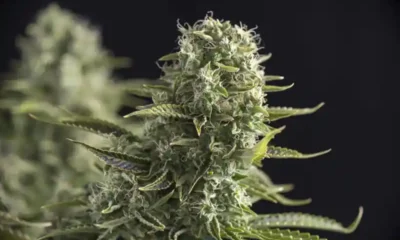Connect with us
Published
1 year agoon

It’s no secret that cannabis is shown to have pain-relieving properties and aid in curbing a number of painful symptoms from a number of diseases, though new data finds that cannabis can also provide benefits among patients with nerve pain.
A recent study published in American Journal of Hospice and Palliative Medicine found that patients with Charcot-Marie-Tooth (CMT) disease, a genetic nerve pain disorder, frequently reported that cannabis relieves their nerve pain and lessens their need for prescription medications.
CMT mostly occurs in arms and legs and results in smaller, weaker muscles. Symptoms generally appear in adolescence or early adulthood, though they may also develop later in life. As CMT progresses, muscle weakness and lack of sensation can progress, moving from legs and feet to hand and arms.
In addition to hindering manual dexterity and hand strength, prolonged problems with walking and posture can strain the body, leading to muscle and joint pain. Damaged nerves can also cause neuropathic pain, and mobility issues tend to worsen with age.
The team of investigators affiliated with Pennsylvania’s Geisinger Commonwealth School of Medicine surveyed 56 patients with CMT, who overwhelmingly reported that cannabis aids in their symptom relief. Patients were recruited through the Hereditary Neuropathy Foundation and completed an online survey, containing 52 multiple choice questions exploring demographics, medical cannabis use, symptomatology, efficacy and adverse effects.
More than 90% of respondents reported that cannabis use reduced their overall pain by at least half; the most common response was an 80% reduction in pain. Additionally, 80% of respondents said that they used fewer opioids after beginning cannabis therapy. Participants also said that cannabis use helped with other symptoms, with 69% reporting reduced use of sleep aids and 50% reporting a decrease in anxiety and antidepressant usage.
While 23.5% of respondents reported negative side effects, 91.7% of that subgroup indicated that they have no plans to stop their cannabis consumption. Additionally, the survey found that 33.9% of patients possessed a medical card; patient perceptions of their physicians’ attitudes surrounding medical cannabis use also “greatly impacted” whether respondents informed their providers of their cannabis use.
“The vast majority of patients with CMT reported that cannabis was effective to manage pain symptoms,” the study concluded. “These data support the need for prospective, randomized, controlled trials using standardized dosing protocols to further delineate and optimize the potential use of cannabis to treat pain related to CMT.”
Several of the study’s findings have already been affirmed, notably the fact that medical cannabis use tends to reduce opioid use in patients. In October 2022, a survey conducted among 2,183 Florida medical cannabis patients self-reporting opioid and medical cannabis use found that 79% reported “cessation or reduction in pain medication use” after beginning a regimen of medical cannabis.
A 2010 study published in the Canadian Medical Association Journal also found that a single inhalation of 25 mg of 9.4% THC cannabis, three times daily for five days, reduced chronic neuropathic pain, improved sleep and was well tolerated by patients. Twenty-one patients completed the trial, which randomly assigned participants to receive cannabis at four potencies (0%, 2.55 6% and 9.4% THC) over four 14-day periods in a crossover trial. Participants then measured their average daily pain using an 11-point numeric rating scale.
The study also found no differences in mood or quality of life, and the most common adverse effects were headache, dry eyes, burning sensation in areas of neuropathic pain, dizziness, numbness and cough.
Regarding pain in general, a new study published last month in the journal Substance Abuse and Addiction found that a 31% of adults with chronic pain reported using cannabis at some point in their lives to manage pain, 25.9% had used cannabis for pain management in the last year and 23.2% reported using cannabis for pain over the past 30 days.
Researchers once again affirmed, “more than half of adults who used cannabis to manage their chronic pain reported that use of cannabis led them to decrease use of prescription opioid, prescription nonopioid, and over-the-counter pain medications, and less than 1% reported that use of cannabis increased their use of these medications.”


No Increase in DUI Among Young Adults After Pot Legalization in Washington


Berner To Join Cast of The Freak Brothers


Moroccan Farmers Urging Government To Legalize Cannabis


Study: Researchers Present Benefits of Entourage Effect


Anti-Pot Org Claims DEA Administrator Was Not Included in Rescheduling Decision


Some NY Lawmakers Say Illicit Pot Shops Must Close Before Adding Licensed Shops
